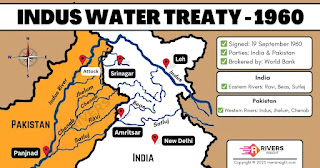India Asks World Bank to Halt Proceedings on Hydropower Dispute After Suspending Indus Waters Treaty
Following
its decision to suspend the Indus Waters Treaty (IWT), India has formally asked
the World Bank-appointed neutral expert to pause ongoing proceedings related to
two contentious hydropower projects in Jammu and Kashmir. These projects —
Kishanganga on the Kishanganga river and Ratle on the Chenab river — have long
been a source of dispute between India and Pakistan.
India’s
request was sent directly to the neutral expert, Michel Lino, who was appointed
by the World Bank to examine technical differences between the two countries
under the framework of the treaty. India cited the government's recent decision
to place the IWT “in abeyance” — essentially putting the agreement on hold — as
the basis for halting the current proceedings.
According
to sources familiar with the matter, Michel Lino has now reached out to
Pakistan to get its stance on India’s request. Unsurprisingly, Pakistan has
objected to any pause, maintaining that the process should continue regardless
of India’s suspension of the treaty.
The
Kishanganga project, already operational, diverts water from a tributary of the
Jhelum River to generate electricity, while the Ratle project is under
development on the Chenab River. Pakistan has repeatedly raised objections to
the design and operation of both projects, claiming they violate the treaty’s
conditions.
India,
on the other hand, maintains that both projects are fully compliant with the
treaty and that Pakistan has used the World Bank's dispute resolution mechanism
as a delaying tactic.
The
decision to suspend the IWT marks a significant shift in India’s approach to
managing water-sharing with Pakistan. New Delhi has argued that the treaty’s
spirit has been undermined by Pakistan’s repeated attempts to internationalize
bilateral issues and involve third-party intervention through legal and
diplomatic pressure.
India’s
call for a pause in the World Bank expert’s process is being viewed as a direct
consequence of this broader strategic rethinking. It remains to be seen how the
World Bank and the neutral expert will respond, especially as the dispute
resolution mechanisms under the treaty are now in a legal and diplomatic grey
zone due to India’s suspension of the agreement.



No comments:
Post a Comment